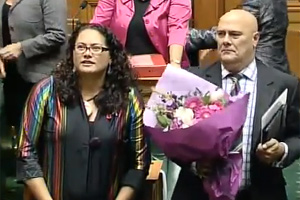New Zealand's parliament has voted 77 to 44 to approve the Marriage Equality Bill on its third and final reading on Wednesday night.
MPs and those in the public gallery broke into applause after the results was announced after a two-hour debate. They then broke into song singing the New Zealand love song "Pokarekare Ana" in the indigenous Maori language as those opposed to the bill quietly left the public gallery.

Labour MP Louisa Wall (left) and National MP Tau Henare
were presented with flowers in Parliament.
The bill was sponsored by opposition Labour MP Louisa Wall. MPs were allowed a conscience vote on the bill and did not have to vote along party lines.
Wall, who is gay, said it was important to learn from history, and cited examples of marriage being used as a tool of oppression – the banning of marriage between German nationals and Jews in 1935, and the banning of interracial marriage in South Africa before 1985.
"Excluding a group in society from marriage is oppressive and unacceptable. Today we're embarrassed and appalled by these examples. And in every instance it was action by the state. This is not about church teachings or philosophy. It never has been.
"It's about the State excluding people from the institution of marriage because of their sex, sexual orientation or gender identity. And that's no different from the actions taken in these historical examples."
The bill will take effect in mid August and comes 27 years after New Zealand decriminalised homosexuality, notes the New Zealand Herald.
MPs and those in the public gallery breaking into song singing
the New Zealand love song "Pokarekare Ana"
National MP Maurice Williamson delivers a witty and uplifting pro-gay
marriage speech: “All we are doing with this bill is allowing two people
who love each other to have that love recognized by way of marriage.
That is all we are doing. We are not declaring nuclear war on a foreign state.
We are not bringing a virus in that could wipe out our agriculture
sector forever. We are allowing two people who love each other
to have that recognized..."
ACT leader John Banks, who as a former National MP was a leading opponent
of decriminalising homosexuality in the 1980s, admitted his views
had changed since he described the 1986 Homosexual Law Reform bill as
evil and sickening. After "three decades, and ten Parliaments, I have had
time to reflect", he told Parliament. "To reflect on what I said, and what I did.
"If I knew then, what I have learned since, I would have acted differently."
Source: The Southland Times (Stuff.co.nz)
